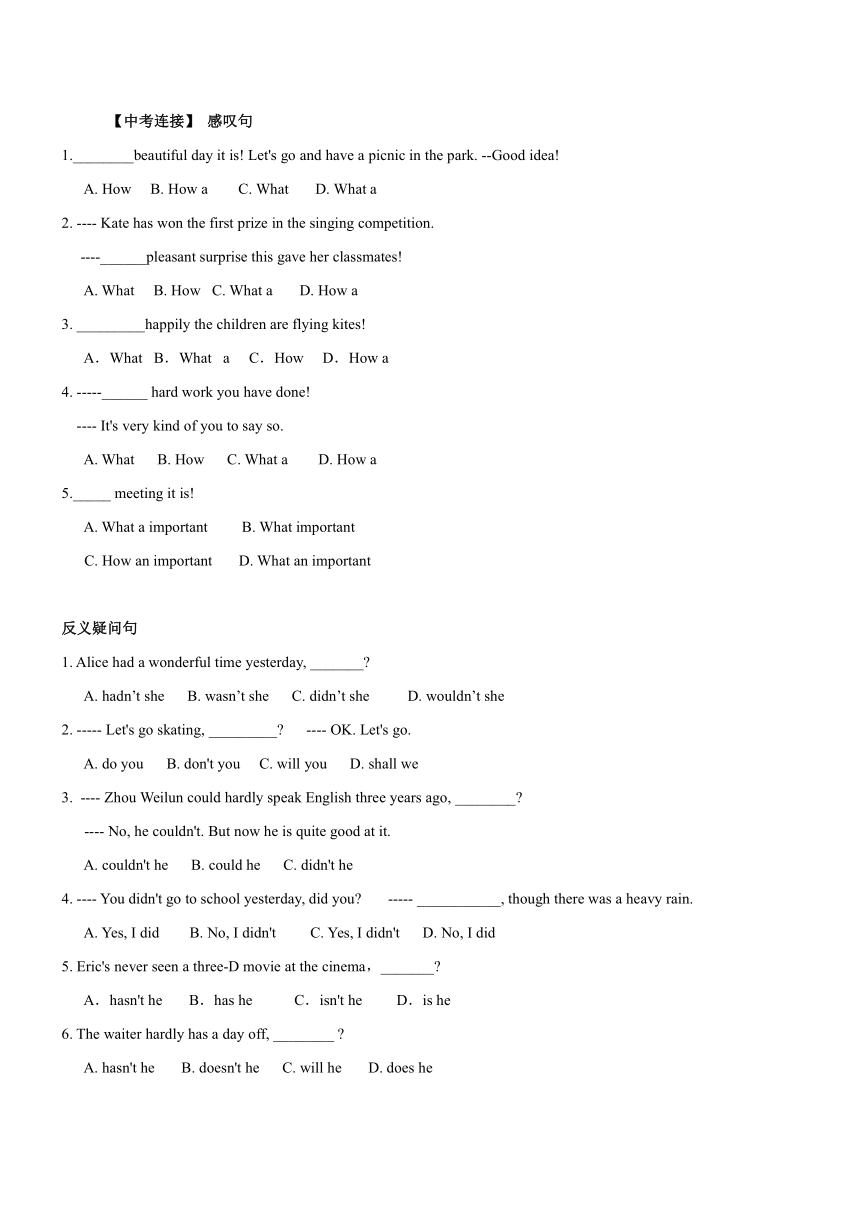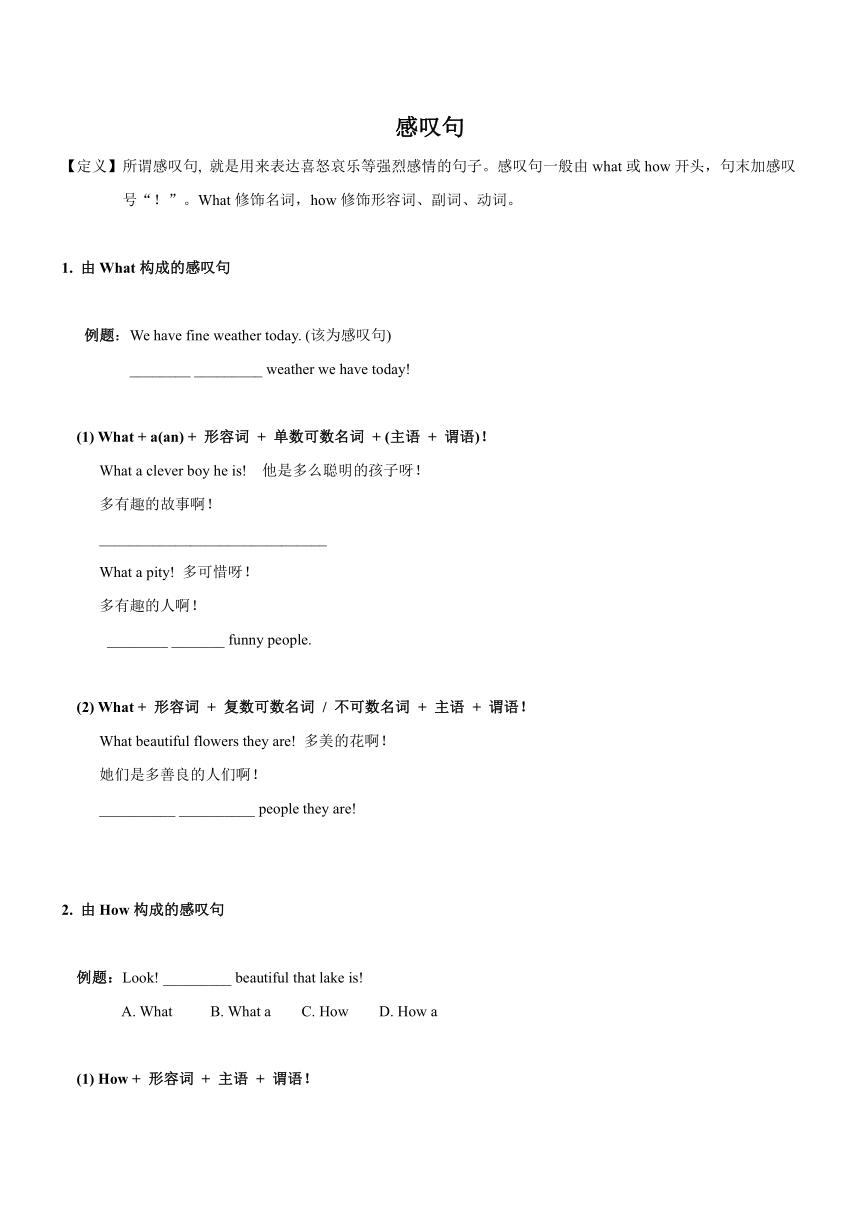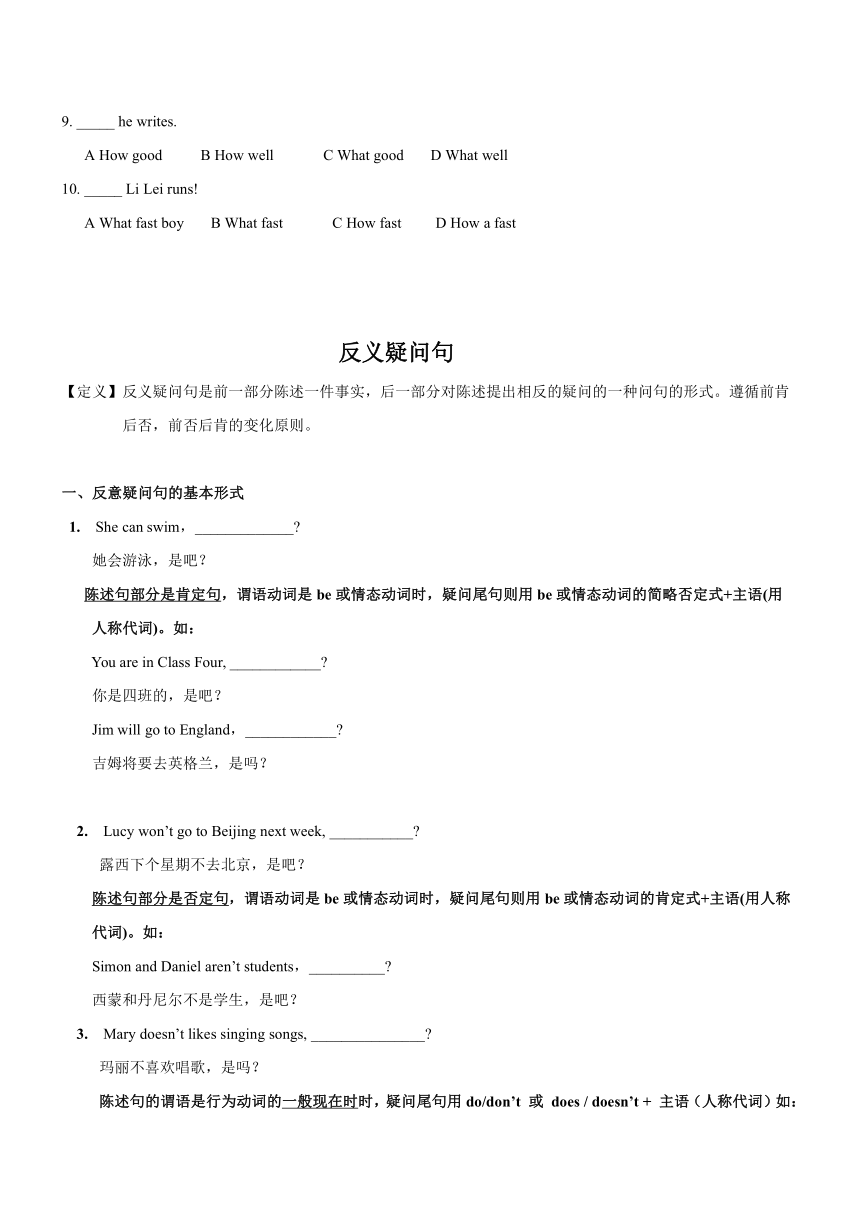2024年中考英语复习反义疑问句&感叹句(无答案)
文档属性
| 名称 | 2024年中考英语复习反义疑问句&感叹句(无答案) |

|
|
| 格式 | docx | ||
| 文件大小 | 47.0KB | ||
| 资源类型 | 教案 | ||
| 版本资源 | 通用版 | ||
| 科目 | 英语 | ||
| 更新时间 | 2024-05-29 21:58:03 | ||
图片预览




文档简介
【中考连接】 感叹句
1.________beautiful day it is! Let's go and have a picnic in the park. --Good idea!
A. How B. How a C. What D. What a
2. ---- Kate has won the first prize in the singing competition.
----______pleasant surprise this gave her classmates!
A. What B. How C. What a D. How a
3. _________happily the children are flying kites!
A.What B.What a C.How D.How a
4. -----______ hard work you have done!
---- It's very kind of you to say so.
A. What B. How C. What a D. How a
5._____ meeting it is!
A. What a important B. What important
C. How an important D. What an important
反义疑问句
1. Alice had a wonderful time yesterday, _______
A. hadn’t she B. wasn’t she C. didn’t she D. wouldn’t she
2. ----- Let's go skating, _________ ---- OK. Let's go.
A. do you B. don't you C. will you D. shall we
---- Zhou Weilun could hardly speak English three years ago, ________
---- No, he couldn't. But now he is quite good at it.
A. couldn't he B. could he C. didn't he
4. ---- You didn't go to school yesterday, did you ----- ___________, though there was a heavy rain.
A. Yes, I did B. No, I didn't C. Yes, I didn't D. No, I did
5. Eric's never seen a three-D movie at the cinema,_______
A.hasn't he B.has he C.isn't he D.is he
6. The waiter hardly has a day off, ________
A. hasn't he B. doesn't he C. will he D. does he
感叹句
【定义】所谓感叹句, 就是用来表达喜怒哀乐等强烈感情的句子。感叹句一般由what或how开头,句末加感叹
号“!”。What修饰名词,how修饰形容词、副词、动词。
由What构成的感叹句
例题:We have fine weather today. (该为感叹句)
________ _________ weather we have today!
(1) What + a(an) + 形容词 + 单数可数名词 + (主语 + 谓语)!
What a clever boy he is! 他是多么聪明的孩子呀!
多有趣的故事啊!
______________________________
What a pity! 多可惜呀!
多有趣的人啊!
________ _______ funny people.
(2) What + 形容词 + 复数可数名词 / 不可数名词 + 主语 + 谓语!
What beautiful flowers they are! 多美的花啊!
她们是多善良的人们啊!
__________ __________ people they are!
由How构成的感叹句
例题:Look! _________ beautiful that lake is!
A. What B. What a C. How D. How a
(1) How + 形容词 + 主语 + 谓语!
How beautiful the girl is!那位姑娘多么漂亮呀!
多有趣的故事啊!
______________________________
(2) How + 副词 + 主语 + 谓语!
How fast he runs! 他跑得多么快呀
他是多么的勤劳啊!
_________ __________ he works!
(3) How + 主语 + 谓语!
How time flies! 时间过得真快呀!
我多么想你啊!
__________ I miss you!
【练一练】
_________clever girl she is!
A. What a B. What C. How a D. H ow
2. __________interesting story it is!
A. What an B. What a C. How an D. How
3. _______ children they are!
A. What B. What a C. How a D. How
4. ____________flowers they are!
A. What beautiful B. What a beautiful C. How beautiful D. How a beautiful
5. ___________ it is today!
A. How cold B. What cold C. How a cold D. What a cold
6. _______bad the weather is!
A. How B. What C. What a D. How a
7. _____go news it is !
A How B What a C How a D What
8. ______the sunshine is!
A What a bright B How a bright C How bright D what bright
9. _____ he writes.
A How good B How well C What good D What well
10. _____ Li Lei runs!
A What fast boy B What fast C How fast D How a fast
反义疑问句
【定义】反义疑问句是前一部分陈述一件事实,后一部分对陈述提出相反的疑问的一种问句的形式。遵循前肯
后否,前否后肯的变化原则。
反意疑问句的基本形式
1. She can swim,_____________
她会游泳,是吧?
陈述句部分是肯定句,谓语动词是be或情态动词时,疑问尾句则用be或情态动词的简略否定式+主语(用
人称代词)。如:
You are in Class Four, ____________
你是四班的,是吧?
Jim will go to England,____________
吉姆将要去英格兰,是吗?
2. Lucy won’t go to Beijing next week, ___________
露西下个星期不去北京,是吧?
陈述句部分是否定句,谓语动词是be或情态动词时,疑问尾句则用be或情态动词的肯定式+主语(用人称
代词)。如:
Simon and Daniel aren’t students,__________
西蒙和丹尼尔不是学生,是吧?
3. Mary doesn’t likes singing songs, _______________
玛丽不喜欢唱歌,是吗?
陈述句的谓语是行为动词的一般现在时时,疑问尾句用do/don’t 或 does / doesn’t + 主语(人称代词)如:
Your friends live in Beijing, _____________
你的朋友住在北京,是吗?
4. Simon and I didn’t go to Beijing last summer holiday, ___________
西蒙和我上个暑假没去北京,是吗?
陈述句的谓语是行为动词的一般过去时时,疑问尾句用did/didn’t + 主语(用人称代词)如:
Jenny went to Shanghai for an important meeting, ___________
珍妮去上海参加一个重要的会议了,是吧?
5. They hadn’t had their breakfast before you telephoned them, __________ they
在你打电话之前他们还没有吃早饭,是吧?
陈述句谓语是行为动词的完成时时,疑问尾句用have的适当形式+主语(用人称代词)。如:
The workers have finished their work, _________ they
工人们已经完成了他们的工作,是吧
The swimmer hasn’t reached the end, ___________ he
那个游泳的人还没有游到岸,是吧?
反义疑问句的特殊形式
1. There is a girl over there, ____________
有位女孩在那边,是吗?
陈述部分是there be机构时,疑问尾句部分用be there的适当形式。如:
There isn’t any water in the glass, ____________
杯子里没有水,是吗?
2. You must be hungry, ___________
你肯定饿了,是吧?
We must study hard, ___________
我们必须努力学习,是吧?
陈述部分含有情态动词must+be表示“推测”时,疑问尾句部分用isn’t/aren’t+主语(用人称代词),不可用
mustn’t。如:
The bag must be yours, isn’t it
这个包一定是你的,是吧?
注意:① 如果must表示“必须”时,疑问尾句部如 needn’t。如:
I must finish my homework today,_________
我必须今天做完作业,是吗?
② 当陈述部分有mustn’t表示“禁止”时,疑问尾句一般用must。如:
You mustn’t play football in the street, __________
你不能在街上踢足球,是吧?
No one like him, ___________
没人喜欢他,是吧?
陈述部分有no, never, hardly, seldom, few, little, nothing等否定词或半否定词时,疑问尾句用肯定形式。如:
Nobody wants to go there, _________ he
没有人想去那儿,是吧?
4. The girl is too careless, ____________
这个女孩太粗心了,是吧?
当陈述部分出现否定词缀(前缀或后缀)时, 疑问尾句仍用否定结构。如:
The man was very unhappy, ___________
这个男人非常不开心,是吧?
5. I don’t think she cares, ___________
我认为她不关心,是吧?
当陈述部分为I think / believe / guess / suppose +宾语从句时,疑问尾句的动词和主语应和宾语从句的动词和
主语保持一致,并根据主语选用肯定或否定形式。如:
I suppose he’s serious, isn’t he
我猜想他是认真的,是吧?
当祈使句为let’s....结构时,疑问尾句部分用shall we, 如果是let us...结构,则用will you, 如:
Let’s go climbing the hill, shall we
咱们去爬山,好吗?
Let us go home, will you
让我们回家,好吗?
7. Don’t play with fire, ____________
别玩火,好吗?
当陈述部分为肯定祈使句时,疑问尾句可以用will you或won’t you; 当陈述部分为否定祈使句时,疑问尾句
用will you。如:
Look at the map, will / won’t you
看这张地图,好吗?
Doing is more important than speaking, ____________
做比说更重要,是吧?
当陈述部分主语是从句、不定式(短语)、动词ing形式时,反意疑问句的主语应用it。如:
What you need is more important, isn’t it
你需要的东西更重要,是吧?
Everything goes well here, ___________
一切进行顺利,是吧?
当陈述部分的主语是everything, nothing, anything something时,反意疑问句的主语应用it。如:
Something is wrong with my radio, isn't it
我的收音机出毛病了,是吧?
Everybody is here, ____________
所有人都在,是吧?
当陈述的部分为指人的不定代词somebody, anybody, everybody等时,疑问尾句的主语可用he或they,但
不可用it来代替。如:
Somebody is waiting for you in the office, isn’t he
有人正在办公室等你,是吗?
11. 那些不是你的苹果,是吗?
Those aren’t your apples, ____________
当陈述部分的主语为this, that时,疑问尾句主语应用it。当陈述部分的主语为these, those时,疑问尾句主
语应用they. 如:
这是一本书,是吗?
This is a book, ____________
12. 当陈述部分的动词为have (has) 时,有下列几种情况:
(l) have在一般现在时中表示“有”,疑问尾句的动词可用have, 也可用do,如:
She has a new pen, hasn’t /doesn’t she
她有一支新钢笔,是吗?
(2) have to 表示“不得不”时,疑问尾句的动词用do。如:
Tom has to go home at once, doesn’t he
汤姆不得不马上回家,是吗?
(3) have表示“吃、喝、玩、度过”等意思时,疑问尾句的动词用do,如:
They had noodles for lunch, didn’t they
他们午饭吃的面条, 是吗?
(4) had better用在陈述部分时,疑问尾句的动词用had,如:
You had better finish your homework on time, ___________
(5) 当陈述部分为I am时,疑问尾句的动词用aren’t I, 如:
I am very tall, _____________
三、反意疑问句的回答
应根据实际情况对反意疑问句进行回答
(1) 如果答案是肯定的,就用yes,后跟肯定形式的回答方式;
(2) 如果答案是否定的,就用no, 后跟否定形式的回答方式。 注意对yes和no的翻译。如:
----- He didn't go to work by bike yesterday, did he
他昨天没骑自行车去上班,是吗?
---- No, he didn't He took a bus.
是的,他没骑。他乘公交车了
【练一练】----- Lily didn’t come here, ___________
莉莉昨天没有来这,是吗?
----- __________________.
不,她有来。
【练习】
1. There is some milk in the bottle ,______________
2. There is little orange , ______________________
3. Tom is good at English, ____________________
4. He has few friends here , ___________________
5. They finished the work , ____________________
6. Sally can hardly speak Chinese ,______________
7. Your parents can swim ,_____________________
8. He could see nobody in the room ,____________
9. Mr. Green teaches you English , ______________
10. Don’t turn on the TV,______________________
11. Let’s go shopping , _______________________
1.________beautiful day it is! Let's go and have a picnic in the park. --Good idea!
A. How B. How a C. What D. What a
2. ---- Kate has won the first prize in the singing competition.
----______pleasant surprise this gave her classmates!
A. What B. How C. What a D. How a
3. _________happily the children are flying kites!
A.What B.What a C.How D.How a
4. -----______ hard work you have done!
---- It's very kind of you to say so.
A. What B. How C. What a D. How a
5._____ meeting it is!
A. What a important B. What important
C. How an important D. What an important
反义疑问句
1. Alice had a wonderful time yesterday, _______
A. hadn’t she B. wasn’t she C. didn’t she D. wouldn’t she
2. ----- Let's go skating, _________ ---- OK. Let's go.
A. do you B. don't you C. will you D. shall we
---- Zhou Weilun could hardly speak English three years ago, ________
---- No, he couldn't. But now he is quite good at it.
A. couldn't he B. could he C. didn't he
4. ---- You didn't go to school yesterday, did you ----- ___________, though there was a heavy rain.
A. Yes, I did B. No, I didn't C. Yes, I didn't D. No, I did
5. Eric's never seen a three-D movie at the cinema,_______
A.hasn't he B.has he C.isn't he D.is he
6. The waiter hardly has a day off, ________
A. hasn't he B. doesn't he C. will he D. does he
感叹句
【定义】所谓感叹句, 就是用来表达喜怒哀乐等强烈感情的句子。感叹句一般由what或how开头,句末加感叹
号“!”。What修饰名词,how修饰形容词、副词、动词。
由What构成的感叹句
例题:We have fine weather today. (该为感叹句)
________ _________ weather we have today!
(1) What + a(an) + 形容词 + 单数可数名词 + (主语 + 谓语)!
What a clever boy he is! 他是多么聪明的孩子呀!
多有趣的故事啊!
______________________________
What a pity! 多可惜呀!
多有趣的人啊!
________ _______ funny people.
(2) What + 形容词 + 复数可数名词 / 不可数名词 + 主语 + 谓语!
What beautiful flowers they are! 多美的花啊!
她们是多善良的人们啊!
__________ __________ people they are!
由How构成的感叹句
例题:Look! _________ beautiful that lake is!
A. What B. What a C. How D. How a
(1) How + 形容词 + 主语 + 谓语!
How beautiful the girl is!那位姑娘多么漂亮呀!
多有趣的故事啊!
______________________________
(2) How + 副词 + 主语 + 谓语!
How fast he runs! 他跑得多么快呀
他是多么的勤劳啊!
_________ __________ he works!
(3) How + 主语 + 谓语!
How time flies! 时间过得真快呀!
我多么想你啊!
__________ I miss you!
【练一练】
_________clever girl she is!
A. What a B. What C. How a D. H ow
2. __________interesting story it is!
A. What an B. What a C. How an D. How
3. _______ children they are!
A. What B. What a C. How a D. How
4. ____________flowers they are!
A. What beautiful B. What a beautiful C. How beautiful D. How a beautiful
5. ___________ it is today!
A. How cold B. What cold C. How a cold D. What a cold
6. _______bad the weather is!
A. How B. What C. What a D. How a
7. _____go news it is !
A How B What a C How a D What
8. ______the sunshine is!
A What a bright B How a bright C How bright D what bright
9. _____ he writes.
A How good B How well C What good D What well
10. _____ Li Lei runs!
A What fast boy B What fast C How fast D How a fast
反义疑问句
【定义】反义疑问句是前一部分陈述一件事实,后一部分对陈述提出相反的疑问的一种问句的形式。遵循前肯
后否,前否后肯的变化原则。
反意疑问句的基本形式
1. She can swim,_____________
她会游泳,是吧?
陈述句部分是肯定句,谓语动词是be或情态动词时,疑问尾句则用be或情态动词的简略否定式+主语(用
人称代词)。如:
You are in Class Four, ____________
你是四班的,是吧?
Jim will go to England,____________
吉姆将要去英格兰,是吗?
2. Lucy won’t go to Beijing next week, ___________
露西下个星期不去北京,是吧?
陈述句部分是否定句,谓语动词是be或情态动词时,疑问尾句则用be或情态动词的肯定式+主语(用人称
代词)。如:
Simon and Daniel aren’t students,__________
西蒙和丹尼尔不是学生,是吧?
3. Mary doesn’t likes singing songs, _______________
玛丽不喜欢唱歌,是吗?
陈述句的谓语是行为动词的一般现在时时,疑问尾句用do/don’t 或 does / doesn’t + 主语(人称代词)如:
Your friends live in Beijing, _____________
你的朋友住在北京,是吗?
4. Simon and I didn’t go to Beijing last summer holiday, ___________
西蒙和我上个暑假没去北京,是吗?
陈述句的谓语是行为动词的一般过去时时,疑问尾句用did/didn’t + 主语(用人称代词)如:
Jenny went to Shanghai for an important meeting, ___________
珍妮去上海参加一个重要的会议了,是吧?
5. They hadn’t had their breakfast before you telephoned them, __________ they
在你打电话之前他们还没有吃早饭,是吧?
陈述句谓语是行为动词的完成时时,疑问尾句用have的适当形式+主语(用人称代词)。如:
The workers have finished their work, _________ they
工人们已经完成了他们的工作,是吧
The swimmer hasn’t reached the end, ___________ he
那个游泳的人还没有游到岸,是吧?
反义疑问句的特殊形式
1. There is a girl over there, ____________
有位女孩在那边,是吗?
陈述部分是there be机构时,疑问尾句部分用be there的适当形式。如:
There isn’t any water in the glass, ____________
杯子里没有水,是吗?
2. You must be hungry, ___________
你肯定饿了,是吧?
We must study hard, ___________
我们必须努力学习,是吧?
陈述部分含有情态动词must+be表示“推测”时,疑问尾句部分用isn’t/aren’t+主语(用人称代词),不可用
mustn’t。如:
The bag must be yours, isn’t it
这个包一定是你的,是吧?
注意:① 如果must表示“必须”时,疑问尾句部如 needn’t。如:
I must finish my homework today,_________
我必须今天做完作业,是吗?
② 当陈述部分有mustn’t表示“禁止”时,疑问尾句一般用must。如:
You mustn’t play football in the street, __________
你不能在街上踢足球,是吧?
No one like him, ___________
没人喜欢他,是吧?
陈述部分有no, never, hardly, seldom, few, little, nothing等否定词或半否定词时,疑问尾句用肯定形式。如:
Nobody wants to go there, _________ he
没有人想去那儿,是吧?
4. The girl is too careless, ____________
这个女孩太粗心了,是吧?
当陈述部分出现否定词缀(前缀或后缀)时, 疑问尾句仍用否定结构。如:
The man was very unhappy, ___________
这个男人非常不开心,是吧?
5. I don’t think she cares, ___________
我认为她不关心,是吧?
当陈述部分为I think / believe / guess / suppose +宾语从句时,疑问尾句的动词和主语应和宾语从句的动词和
主语保持一致,并根据主语选用肯定或否定形式。如:
I suppose he’s serious, isn’t he
我猜想他是认真的,是吧?
当祈使句为let’s....结构时,疑问尾句部分用shall we, 如果是let us...结构,则用will you, 如:
Let’s go climbing the hill, shall we
咱们去爬山,好吗?
Let us go home, will you
让我们回家,好吗?
7. Don’t play with fire, ____________
别玩火,好吗?
当陈述部分为肯定祈使句时,疑问尾句可以用will you或won’t you; 当陈述部分为否定祈使句时,疑问尾句
用will you。如:
Look at the map, will / won’t you
看这张地图,好吗?
Doing is more important than speaking, ____________
做比说更重要,是吧?
当陈述部分主语是从句、不定式(短语)、动词ing形式时,反意疑问句的主语应用it。如:
What you need is more important, isn’t it
你需要的东西更重要,是吧?
Everything goes well here, ___________
一切进行顺利,是吧?
当陈述部分的主语是everything, nothing, anything something时,反意疑问句的主语应用it。如:
Something is wrong with my radio, isn't it
我的收音机出毛病了,是吧?
Everybody is here, ____________
所有人都在,是吧?
当陈述的部分为指人的不定代词somebody, anybody, everybody等时,疑问尾句的主语可用he或they,但
不可用it来代替。如:
Somebody is waiting for you in the office, isn’t he
有人正在办公室等你,是吗?
11. 那些不是你的苹果,是吗?
Those aren’t your apples, ____________
当陈述部分的主语为this, that时,疑问尾句主语应用it。当陈述部分的主语为these, those时,疑问尾句主
语应用they. 如:
这是一本书,是吗?
This is a book, ____________
12. 当陈述部分的动词为have (has) 时,有下列几种情况:
(l) have在一般现在时中表示“有”,疑问尾句的动词可用have, 也可用do,如:
She has a new pen, hasn’t /doesn’t she
她有一支新钢笔,是吗?
(2) have to 表示“不得不”时,疑问尾句的动词用do。如:
Tom has to go home at once, doesn’t he
汤姆不得不马上回家,是吗?
(3) have表示“吃、喝、玩、度过”等意思时,疑问尾句的动词用do,如:
They had noodles for lunch, didn’t they
他们午饭吃的面条, 是吗?
(4) had better用在陈述部分时,疑问尾句的动词用had,如:
You had better finish your homework on time, ___________
(5) 当陈述部分为I am时,疑问尾句的动词用aren’t I, 如:
I am very tall, _____________
三、反意疑问句的回答
应根据实际情况对反意疑问句进行回答
(1) 如果答案是肯定的,就用yes,后跟肯定形式的回答方式;
(2) 如果答案是否定的,就用no, 后跟否定形式的回答方式。 注意对yes和no的翻译。如:
----- He didn't go to work by bike yesterday, did he
他昨天没骑自行车去上班,是吗?
---- No, he didn't He took a bus.
是的,他没骑。他乘公交车了
【练一练】----- Lily didn’t come here, ___________
莉莉昨天没有来这,是吗?
----- __________________.
不,她有来。
【练习】
1. There is some milk in the bottle ,______________
2. There is little orange , ______________________
3. Tom is good at English, ____________________
4. He has few friends here , ___________________
5. They finished the work , ____________________
6. Sally can hardly speak Chinese ,______________
7. Your parents can swim ,_____________________
8. He could see nobody in the room ,____________
9. Mr. Green teaches you English , ______________
10. Don’t turn on the TV,______________________
11. Let’s go shopping , _______________________
同课章节目录
- 词法
- 名词
- 动词和动词短语
- 动词语态
- 动词时态
- 助动词和情态动词
- 非谓语动词
- 冠词
- 代词
- 数词和量词
- 形容词副词及其比较等级
- 介词和介词短语
- 连词和感叹词
- 构词法
- 相似、相近词比较
- 句法
- 陈述句
- 一般疑问句和否定疑问句
- 特殊疑问句及选择疑问句
- 反意疑问句
- 存在句(There be句型)
- 宾语从句
- 定语从句
- 状语从句
- 主谓一致问题
- 简单句
- 并列句
- 复合句
- 主谓一致
- 主、表语从句
- 名词性从句
- 直接引语和间接引语
- 虚拟语气
- 感叹句
- 强调句
- 倒装句
- 祈使句
- 句子的成分
- 句子的分类
- 题型专区
- 单项选择部分
- 易错题
- 完形填空
- 阅读理解
- 词汇练习
- 听说训练
- 句型转换
- 补全对话
- 短文改错
- 翻译
- 书面表达
- 任务型阅读
- 语法填空
- 其他资料
